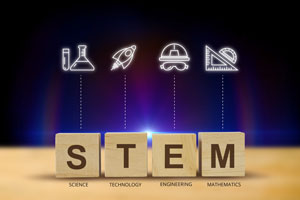LC Interpreting Services is now SignNexus!
STEM Interpreting
 Science, Technology, Engineering, and Mathematics (STEM) courses prove challenging for much of the general population. Yet talented deaf individuals continue to flood these growing fields. People who are deaf can absolutely excel in STEM careers when they are able to access opportunities in the classroom and the workplace.
Science, Technology, Engineering, and Mathematics (STEM) courses prove challenging for much of the general population. Yet talented deaf individuals continue to flood these growing fields. People who are deaf can absolutely excel in STEM careers when they are able to access opportunities in the classroom and the workplace.
For those who use ASL as their primary form of communication, a qualified Technical Interpreter is often the best accommodation during lectures, trainings, meetings, seminars, conferences, or consultations. Qualified Technical Interpreters will possess a specific skill set which enables them to facilitate communication regarding sophisticated technical topics. They have the ability to provide interpreting services in specialized fields which often have their own unique vocabulary and culture.
Things to Look for in High Quality STEM & Technical ASL Interpreters
Linguistically Fluent
 Those who provide technical or scientific interpreting services must have a proven background in both spoken and signed languages, including individuals who have heavy spoken accents. Qualified Technical Interpreters will understand how specific terms fit into context, and are able to accurately convey abstract concepts. Deaf individuals in the STEM fields have varying levels of education and experience, and they might prefer different communication modalities, such as PSE (Pidgin Sign English). These interpreters are expected to be linguistically fluent and culturally competent to stay on the consumer’s level.
Those who provide technical or scientific interpreting services must have a proven background in both spoken and signed languages, including individuals who have heavy spoken accents. Qualified Technical Interpreters will understand how specific terms fit into context, and are able to accurately convey abstract concepts. Deaf individuals in the STEM fields have varying levels of education and experience, and they might prefer different communication modalities, such as PSE (Pidgin Sign English). These interpreters are expected to be linguistically fluent and culturally competent to stay on the consumer’s level.
Familiar with Field of Study
Whether they are interpreting a biology lecture, a tech conference, or an architectural meeting, qualified Technical Interpreters come prepared with a general knowledge about the particular field they will be working in. This knowledge provides interpreters the foundation they need to further the Technical Interpreters might have experience, specialized training, or a true passion for a specific area of study. Ultimately, deaf consumers are better served by interpreters who are interested in the work they do.
Specialized Vocabulary
 The many STEM disciplines all come with their own vocabulary, and some of these terms do not have an ASL translation. Scientific and technical terminology can be complex and difficult for laypeople to understand. Qualified Technical Interpreters learn the jargon and common concepts within a profession, which helps them better facilitate communication. They also keep up to date on emerging vocabulary within the field.
The many STEM disciplines all come with their own vocabulary, and some of these terms do not have an ASL translation. Scientific and technical terminology can be complex and difficult for laypeople to understand. Qualified Technical Interpreters learn the jargon and common concepts within a profession, which helps them better facilitate communication. They also keep up to date on emerging vocabulary within the field.
Collaborative
 Interpreters who work in technical and scientific environments must prepare as much as possible in advance, but often they end up learning quite a bit during the assignment. In these fields, a qualified Technical Interpreter will defer to the knowledge and preferences of the deaf consumer. Interpreters should be open to gaining greater understanding of the topics they interpret, certain professional protocol, and be able to apply this knowledge in future assignments.
Interpreters who work in technical and scientific environments must prepare as much as possible in advance, but often they end up learning quite a bit during the assignment. In these fields, a qualified Technical Interpreter will defer to the knowledge and preferences of the deaf consumer. Interpreters should be open to gaining greater understanding of the topics they interpret, certain professional protocol, and be able to apply this knowledge in future assignments.
Educator
Interpreters might not be needed on a daily basis, but for lectures, group meetings, or professional development events, a high quality Technical Interpreter is most likely the best accommodation for people who are deaf. These interpreters will work with deaf consumers to educate hearing entities about creating equal access and providing adequate opportunities.

A qualified Technical Interpreter knows their limitations and only accepts jobs which match their skills, experience, and capabilities. These interpreters will explain to hiring entities why another interpreter would be a better fit, advocating for the use of Certified Deaf Interpreters (CDIs) wherever appropriate.
Continuous Professional Development
Because the STEM fields are rapidly evolving, with new technologies and methodologies emerging each day, it is imperative that Technical Interpreters keep up to date on best practice. Their technical and vocabulary knowledge must be current, and they will continuously consult other interpreters working within their discipline.
STEM & Technical ASL Interpreting: Consider SignNexus
SignNexus is pleased to offer Technical Interpreting services in the NYC Metropolitan and Westchester area, as well as nearby New Jersey. Our highly qualified ASL interpreters are focused on accuracy and consumer satisfaction. For consumers who prefer Transcription Services we also offer speech to text services for meetings, lectures, and more. SignNexus makes the process of securing appropriate accommodations as simple as possible from start to finish.
> Request Services
Resources:
http://digitalcommons.wou.edu/cgi/viewcontent.cgi?article=1023&context=theses
http://www.nytimes.com/2012/12/04/science/sign-language-researchers-broaden-science-lexicon.html?_r=1
http://www.alsglobal.net/city/los-angeles/technical-interpreters/american-sign-language.php







